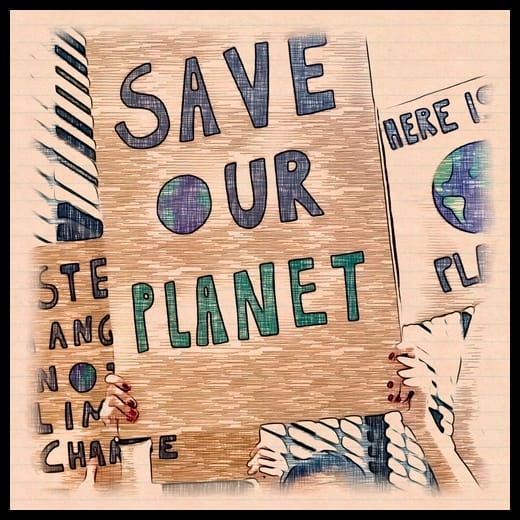
Rampaging wildfires. Frequent floods. The looming threat of all-out war. Meanwhile environmental activists sit in prison cells awaiting trials. Welcome to 2024! Amidst the contemporary whirlwind of clickbait news, political turmoil, and social division, the essential conversations and actions towards climate justice have become increasingly sidelined.
In the face of the monumental challenge that climate change presents, it is easy to feel overwhelmed. This colossal issue affects every one of us, residing on this blue marble, this Earth. It sometimes strikes me as absurd that instead of channeling our collective forces as a species into saving the planet from annihilation, we are escalating conflicts all around the world.
Then, I remember, we are only human.
The vastness of the problem often leaves us immobilized, unsure of how or where to start. At times like these I often look to the ancients for wisdom. Now, I’m going to bring the ancient together with a set of modern ideas.
The historic canon is (of course) Zen Buddhism, with its deep-rooted principles of compassion and interconnectedness. This, combined with the post-industrial Kaizen method of continuous improvement, can offer hope for tackling climate change.
One small step at a time. Let me explain how.
Compassion and Interconnectedness
Zen Buddhism teaches us the importance of compassion and understanding our interconnectedness with the world. This perspective is crucial in the fight against climate change. Climate change does not affect all people equally. Vulnerable populations, including those in low-income communities and indigenous peoples, bear the brunt of climate impacts despite contributing the least to the problem.
Recognizing our bond with the planet and its various peoples, compels us to act not just for our own benefit, but for the well-being of all living beings. It shifts the narrative from one of individual burden to collective responsibility and action. Moreover, Zen Buddhism’s emphasis on harmony with nature speaks to the necessity of restoring and preserving natural habitats and biodiversity.
By understanding that humans are not separate from nature but a part of it, we can begin to see the protection of the environment as integral to our own well-being. This perspective encourages the support of conservation efforts, reforestation projects, and the protection of endangered species. It also invites us to reconsider our agricultural practices, promoting sustainable farming and permaculture techniques that work with the land rather than against it.
Kaizen: Incremental Change for Exponential Impact
The essence of Kaizen lies in the encouragement of small, consistent steps towards improvement. It is, in essence, a powerful strategy for making sustainable living and environmental stewardship achievable for everyone. Climate action at its simplest. Imagine the collective impact of millions of individuals deciding to reduce their waste. This could be by opting for reusables over single-use plastics, embracing public transport (difficult in the UK currently I know), or cycling over personal car usage. These seemingly small choices, when multiplied across communities and nations, have the potential to significantly lower carbon footprints.
The Kaizen approach fosters a mindset of continuous reflection and refinement. The method encourages individuals and communities to constantly seek ways to live more sustainably. It is not just about making a one-time change but about integrating environmental consciousness into the fabric of daily life. There are even beneficial second order effects. For instance, communities coming together to initiate local recycling programs or urban gardening initiatives strengthen social bonds as well as contributing towards environmental betterment.
Navigating Modern UK Politics
In recent years, UK politics has become increasingly divisive, often portraying environmental activism in a negative (even extreme) light. I have talked about supporting peaceful protest movements before. The likes of Insulate Britain and Just Stop Oil (despite their peaceful protests and critical messages) are depicted as threats to our way of life. This is simply nonsense.
Furthermore, the narrative not only undermines the urgency of climate action but also deepens social division. If the media can successfully portray climate protestors and the disruption they cause as the issue, then people are quick to forget the point of the protest. Through the lens of Zen, however, we can see these movements as essential voices calling for action. They remind us that every activity towards this, no matter how small, is a step towards a better future.
A Positive Outlook on Climate Action
The teachings of Zen and the principles of the Kaizen method may not be for everyone. But we all have a perspective on the world events. This perspective colours everything, and if not maintained can slide into despair. It is crucial to continuously nudge our perspectives from dismay to hope. We do this through practical action. Recognizing that each of us has the power to make a difference.
By embracing compassion, interconnectedness, and continuous improvement, we can forge a path of climate action that is effective, just and sustainable. What I’m saying is: Have hope.
Do not be overwhelmed by the scale of the challenge but be inspired by the impact of millions of small steps. I’m aware it is difficult to cut through the disparaging glare of the modern media complex. But if we can hold the possibility of a better world in our collective consciousness then we can surely bring it about. Together, we can craft a greener, and more just tomorrow.
